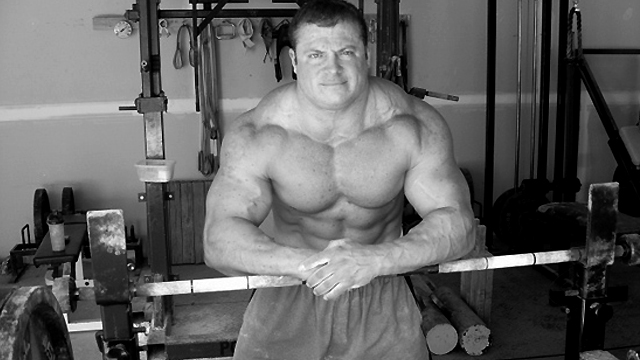Confidence is a Paradox
A few rare people have unlimited faith in their abilities. But for many, confidence is the most difficult type of mental strength to develop.
Such broad ranges of self-opinion can be traced back to childhood. Those blessed with an abundance of confidence usually experienced success early on in life. With each success their confidence grew, leading them to expect more in the future.
Confidence and success work together, and over time the results grow exponentially. But how can an individual with low self-confidence, who hasn't experienced much success in life, turn things around?
I've Been There
I've been through many difficult periods where I doubted my abilities and struggled because of low self-confidence. Fortunately, I've learned to overcome this. Today I have the audacity to believe that I can achieve anything, in the gym and out.
Here's how I did it.
First, you need to eliminate all negative statements aimed at yourself. No matter how bad you fail at something, never, ever refer to yourself in a negative way.
Understand this: Actions fail, individuals do not. In other words, you failed at something because of what you did or didn't do, not because of who you are.
Actions can be changed. Failure is a temporary state that can be turned into success by taking the right action. Believing this is the key to developing a winner's mindset.
Second, learn to disregard negative statements from others. Negativity surrounds us all. There will always be someone telling you that you can't achieve your goals.
They might say they're "only looking out for your best interests" and provide you with several "logical" reasons why you might fail. But no matter how right they appear to be, you must reject this or it will impede your ability to achieve your goals.
Negativity often comes from those closest to you. Sadly, those who've failed to achieve their own success often try to prevent others from achieving it as well. You must be able to completely disregard that negativity or it'll hold you back from your true potential.

Negativity from others can be damaging to your confidence. I was continually subjected to this during adolescence, and often it came from the same people I looked up to. At times, my friends, teachers, coaches and even my own parents were sources of negativity.
One wrestling coach my freshman year of high school was particularly toxic. Wrestling was my favorite sport, and I was able to make the varsity wrestling team and start for our school at 119 pounds. For my first-ever match, I was set to face a kid from our rival school, a wrestling powerhouse that boasted several State champions.
Knowing this made me nervous. Just before stepping onto the mat I asked my coach if my opponent was any good. He replied that the kid was "a fish," a wrestling term meaning a terrible wrestler that spends most of the time on the mat flopping around like a fish out of water.
Before I knew it, this supposed "fish" had taken me down, turned me on my back, and pinned me in less than sixty seconds. I walked off the mat with my head hung low.
I was hoping my coach would remark that he'd mistaken this kid for someone else. After all, the wrestler that had just demolished me couldn't have been that bad. My coach's comment was devastating: "He is that bad. You just suck."
Self-confidence, crushed! But my coach's toxicity didn't stop there.
Later in the season I finally hit a growth spurt causing me to gain weight, and I got the chance to wrestle against a sophomore for the final varsity spot at 132 pounds. Unfortunately, I lost, and afterwards sought my coach's counsel on how to improve and beat this kid next time.
Coach said dryly, "You can't beat him, he's just better than you." Now keep in mind, the previous year this kid had failed to win a single match! My coach really believed he was just too good for me, which tells you what he thought of my wrestling ability.
In spite of his criticism, I'd managed to secure the varsity position at the end of the season. At 138 pounds I moved up another weight class and beat the kid that held the varsity spot. But somehow, things got worse.
I was excited about the upcoming district tournament and the opportunity to advance to the regional tournament. Unfortunately, I'd never get the chance. My coach forgot to list me on the roster. I wasn't allowed to compete.
My coach's response? "What difference does it make? You were never going to make it anywhere anyway."
What bothered me most wasn't his lack of faith in my abilities, but the way he'd say these things, as if my succeeding wasn't even in the realm of possibility.
The damage was done, and the pattern of failure had taken hold. The cumulative effect kept me from achieving many things in my teenage years that I was completely capable of, both athletically and academically.
I realize now that the crucial thing wasn't the incidents themselves, but the effect I let them have on me.Understanding this is essential if we are to successfully defend ourselves from negativity. No matter what someone says to you or who it is that's speaking, the only way it can have any impact is if you choose to believe it.
You must reject every negative statement made toward you. Master the skill of rejecting both internal and external negativity, and you'll master self-confidence.

One effective method is to engage in an abundance of positive self-talk. For this to work, you must do it often and without waver.
Never think in terms of maybe, probably, or possibly. You must use conviction and speak to yourself in absolutes. Tell yourself repeatedly that you're capable of achieving whatever goal it is you have. The more you tell yourself you can, and the more methods you use to do so, the more effective it will become.
When you're alone, speak to yourself out loud, stating how and why you'll achieve your goals. I prefer to look myself in the eye in the mirror while doing this. It helps to make the statement even more real. Also, write yourself notes expressing these ideas and put them in places where you'll see them.
Hokey as it sounds, you must do this until you believe in yourself so absolutely that your confidence becomes unshakable, no matter what anyone says.
Let me be perfectly clear that this isn't about being arrogant. It's about having confidence and faith in your abilities. Don't run around telling others about what you plan to do. You'll only look self-centered.
Remember, confidence is believing you can achieve something; arrogance is telling everyone that you will. You're the only one who needs to believe this anyway. Everyone else's opinion is irrelevant.
It's also important that you're realistic about your goals and positive self-talk. There's a fine line between being extremely confident and just being foolish.
If you cross the line, not only will you fail to achieve your goals, you'll reinforce the idea that you're incompetent. Early in this process, start with smaller, achievable goals that will act as stepping stones to your larger and more long-term aspirations. Minor victories will lead to larger, high-impact victories.
This is a process. Like training our muscles, training our minds takes time and must be done in increments. Success leads to confidence, and the two properly executed act synergistically.
Commit yourself to this process, practice it without wavering, be patient and realistic when setting goals, and you'll soon find confidence to be one of your greatest assets.

Like most kids, my confidence fluctuated radically depending on the events around me. It would be years before I learned how to control my own mind.
The Marine Corps really boosted my self-confidence. I responded well, both mentally and physically, to the demanding environment and ongoing challenges. I learned how much my body could endure when my mind was strong. I thrived in the harsh atmosphere and found that the more difficult the task, the more I could stand out.
One particular event became a major turning point. It was the tiny pebble that started the avalanche. The event itself wasn't all that significant, but the change it set into motion was life altering.
It was the Marine Barracks powerlifting meet. I was twenty years old and hadn't placed first in an event in so long that I'd stopped trying.
But this meet was something I really wanted to win, and since powerlifting is an objective sport, I thought I had a good shot. Had it been something with more room for psychological self-sabotage, I would've continued to wallow in mediocrity.
Luckily, powerlifting is all about numbers. I knew mine and my competitors' numbers, and the answers were black and white. I still remember adding them up repeatedly the day before the meet and being shocked that I really had a chance to win.
My main competition came from a group of Marines known as the "body-bearers," the guys that carried the caskets of deceased Marines and would press them to arms length overhead before lowering them into the ground. They were recruited for their size and strength, and most of these guys were beyond jacked.
One Marine in particular was huge and powerful. I knew that his absolute strength was far above mine, and he also outweighed me by nearly seventy pounds. This competition was based on a formula that took body weight into account, and when I ran the numbers we were neck and neck.
The competition came down to our final deadlifts, and I pulled just enough to edge him out by thousandths of a percentage point. That meet caused a psychological shift in my outlook and confidence level.
I've never looked back. My success that day flipped a switch in my mind – I realized that I'd been looking at everything completely wrong for years. Instead of striving to reach mediocrity, I was determined to reach the top.
I'd been standing in my own way; now it was time to win.
Confidence is a choice. Not only a choice, but a skill you can learn. You can train yourself to become confident in the same way that you can train your muscles to become larger and stronger. To summarize:
- Cease all negative self-talk.
- Disregard all negative statements from others.
- Engage in positive self-talk.
- Be realistic and patient in your goals.
- Use small victories as stepping stones to larger ones.
Work on your attitude like you work on your physical training. In time, no obstacle will stand between you and success.




